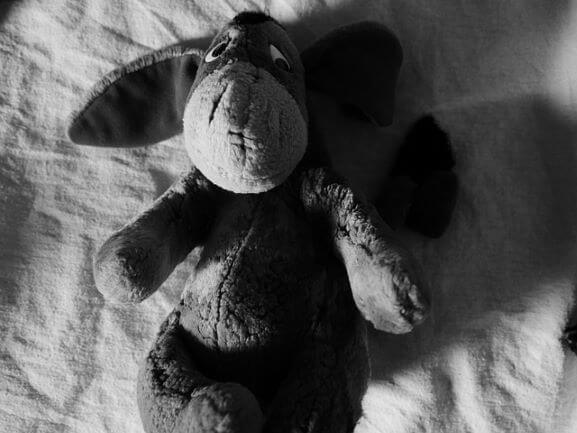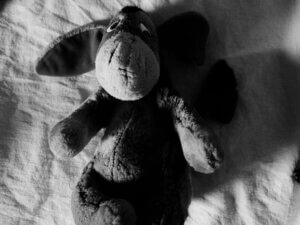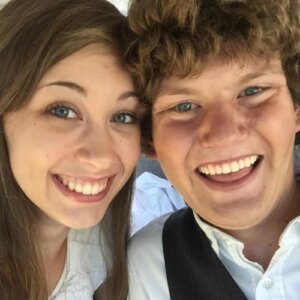
Living Horizontally: My Teenage Experience with Hashimoto’s
It’s hard to pinpoint when my struggle with chronic illness really began, and even harder to accept how long I’ve gone now without significant relief. Somewhere during my senior year of high school (2015-2016), I started to have a massive headache, which became a constant companion. I popped Excedrin and Advil like candy, but nothing seemed to help. My mom told me it was just stress, from worrying about finishing up school or whatever else. Things would get better once summer arrived and I could relax. I believed her, willing to chalk it up to a common cause with simple solutions. Little did I know, this would become my teenage experience with Hashimoto’s.
Although, even then I think a part of me realized there must be something more. After all, I was the only person who truly knew how I was feeling. This seemed like something more. I didn’t want to acknowledge a near-constant headache, extreme fatigue, and terrible muscle aches were abnormal for my age.
 I’d cry in my bed, in so much pain sometimes I couldn’t move. I’d plead to God to take the pain away, tears rolling across my cheeks and over my ears, wetting the pillow. It seemed as though the heavens were shut to me, left to fend for myself. Why? I asked, why are you doing this to me? Thinking back on church lessons, I remembered being told I wouldn’t be given more trials than God thought I could deal with. That they were meant to be for my gain. But it was difficult to believe that. I felt helpless.
I’d cry in my bed, in so much pain sometimes I couldn’t move. I’d plead to God to take the pain away, tears rolling across my cheeks and over my ears, wetting the pillow. It seemed as though the heavens were shut to me, left to fend for myself. Why? I asked, why are you doing this to me? Thinking back on church lessons, I remembered being told I wouldn’t be given more trials than God thought I could deal with. That they were meant to be for my gain. But it was difficult to believe that. I felt helpless.
After begging my mom to get me a doctor’s appointment, I saw a nurse practitioner. She didn’t take us seriously, prescribing a couple headache medications and a thyroid supplement. My mom asked them to test for Hashimoto’s, since my aunt has it and she wondered if maybe I did too. The nurse shrugged her off, telling us to get a chiropractor. I just needed to relax my muscles, I had way too much stiffness in my shoulders. My mom relented, trusting the nurse knew best. I shared that trust.
My parents were a little skeptical a teenager needed a chiropractor, but I went. I remember my first appointment, hearing an audible crack as a couple joints in my neck snapped into their proper position. For months I’d have my neck and back popped, like bubble wrap. The nurses would make me either freeze to death with ice packs or, on a good day, relax me with a heating pad. They’d put vibrating pads on my back, sometimes painful depending on intensity. I still don’t see the point of them. It honestly felt akin to a seizure.
We even got desperate enough to try acupuncture. Now that was an experience. My mom couldn’t stop laughing at how silly I looked with needles sticking out of the back of my head. She used some reference to describe me I can’t remember, but all I could think was how much I looked (and felt) like Pinhead from Hellraiser. I tried to laugh with her, but the needles hurt too much. I never thought I’d try such an unconventional method, but there you go. There comes a point you’re willing to try anything to provide blessed relief. Ironically, I was trying to relieve my pain…with more pain. For some reason though, I wasn’t given that opportunity which I wanted so badly.
All this treatment would provide temporary relief, but the headache didn’t go away. I sometimes wished I could ask my chiropractor: “Who am I to you?” Did he want me to get better, or was I a source for his next Bahamas cruise? Did he actually care, or was I a number? Was he prolonging my pain? These questions would swirl around in my head, unbidden but difficult to ignore.
 He kept a file on my progress and remembered my name (probably because of the file). He never suggested stopping, or saying I was wasting my money because I wasn’t getting any benefits. He’d come in—usually after ten minutes of me lying on my stomach in a room, alone—talk to me briefly and do some back popping, then leave. If we ever made any changes to my treatment, it was because my mom or I asked. I held out hope, because I didn’t know any better.
He kept a file on my progress and remembered my name (probably because of the file). He never suggested stopping, or saying I was wasting my money because I wasn’t getting any benefits. He’d come in—usually after ten minutes of me lying on my stomach in a room, alone—talk to me briefly and do some back popping, then leave. If we ever made any changes to my treatment, it was because my mom or I asked. I held out hope, because I didn’t know any better.
I’m not sure what’s caused me to view that part of my life so cynically, forming my own conspiracy theories about my chiropractor. I think it’s because I put so much trust in him as a physician, who was supposed to heal people. At least, that’s how my eighteen-year-old mind worked. When I didn’t get the results I wanted, I felt betrayed. If he could help so many others feel better, why not me? I concluded he must not have tried hard enough.
Needless to say, at this point I was extremely frustrated. Freshman year was hard! Having my headache made it difficult to focus in school and get assignments done. College was supposed to be the best four years of my life, at least everyone told me so.
When I imagined going to college, I pictured going to every football and basketball game, social event, etc. I’d have the best roommates, who would become my best friends and eventually we’d be each other’s bridesmaids. My dorm room would be cute, with string lights and fun posters. I’d get amazing grades, graduating top of my class and getting awards. Some of that may seem too idealistic, but I was watching it play out around me. When the pain or fatigue was overwhelming, I’d lay in bed, scrolling through Facebook and seeing posts from people in my graduating class living their best life. Without that, I felt like I was cheated. Why was I given such a bad set of cards in life?
Instead of these wonderful possibilities, I was taking naps or staying in weekends. When I stayed on campus my second semester, my roommates thought I was antisocial because they’d go out and do things at ten p.m. or later. I guess eight hours of sleep’s for crazy people?
 I’ve always loved to learn and graduated with a 3.97 GPA. College was different. I found it difficult to focus in lectures or doing assignments. BYU classes are stressful enough without feeling like your head might split open. When I became desperate, I called for an appointment to meet with a counselor at the University Accessibility Center. I had accommodations set up, so I could have extensions on assignments. Even though I was struggling, it was difficult for me to accept I needed external help. I considered asking my teachers for extra time a sign of weakness, that it was me giving up. Other students were completing everything on time, why couldn’t I? I must not be trying hard enough. Even with my accommodations, my grades suffered, and the GPA-based scholarship I’d worked so hard for in high school went away.
I’ve always loved to learn and graduated with a 3.97 GPA. College was different. I found it difficult to focus in lectures or doing assignments. BYU classes are stressful enough without feeling like your head might split open. When I became desperate, I called for an appointment to meet with a counselor at the University Accessibility Center. I had accommodations set up, so I could have extensions on assignments. Even though I was struggling, it was difficult for me to accept I needed external help. I considered asking my teachers for extra time a sign of weakness, that it was me giving up. Other students were completing everything on time, why couldn’t I? I must not be trying hard enough. Even with my accommodations, my grades suffered, and the GPA-based scholarship I’d worked so hard for in high school went away.
I slipped into a pattern of “woe is me,” fixating on my own problems and how unfair it was I had to struggle with so much. Folding in on myself, I became unaware of the struggles of the people around me. I think, in a way, it was partly an act of self-preservation. It’s difficult to look beyond yourself when you’re drowning in your own problems. I was trying my best to tread water and knew if I tried to help someone else, I’d slip beneath the waves, dragged down by their weight.
Yes, I realize some people have a worse life than me, like orphans in Africa or refugees fleeing civil war. In comparison to them, my life is a fairytale. I’m sure they’d gladly take my life in a heartbeat. Or, at least that’s what the “you choose to be happy” crowd tells me. Despite their best intentions, I can only say the influence of those sort of people has been toxic. When nothing feels like it’s getting better, all I can do is try not to cry.
Self-chastisement of this sort has been a voice in the back of my head, for as long as I can remember. It tells me I’m selfish, I should be grateful for what and who I have in my life. What do I have to complain about, anyway? I have a roof over my head, food to eat, and an intact family. Sure, there was a lot of drama, sometimes a good deal of yelling at the house. But still, my parents were together despite that. So many others don’t have those luxuries and barely getting by. Yet, so many manage to stay happy. I have no right to ask for anything else. Right? Beating myself up mentally has become more of a pastime than I’m sure is healthy. And yet, I can’t stop.
 Some people manage to stay optimistic through everything, which I think is completely unnatural. They must be superhuman. Or…aliens? Those seem like the only two viable explanations for the phenomenon. I’ll admit sometimes I’m a little jealous. The rest of the time? Annoyed. They bounce back even in the face of severe loss or pain, like one of those bop bags which comes right back up after a punch knocks it backwards. If life knocks me, I’m usually down for the count. Being horizontal has become a natural state for me. I’m not sure if I’d consider myself weak, just more of an Eeyore than a Tigger. To quote one of my favorite movies: “Life is pain, highness. Anyone who says differently is selling something”.
Some people manage to stay optimistic through everything, which I think is completely unnatural. They must be superhuman. Or…aliens? Those seem like the only two viable explanations for the phenomenon. I’ll admit sometimes I’m a little jealous. The rest of the time? Annoyed. They bounce back even in the face of severe loss or pain, like one of those bop bags which comes right back up after a punch knocks it backwards. If life knocks me, I’m usually down for the count. Being horizontal has become a natural state for me. I’m not sure if I’d consider myself weak, just more of an Eeyore than a Tigger. To quote one of my favorite movies: “Life is pain, highness. Anyone who says differently is selling something”.
Roughly a year after meeting the nurse practitioner, my mom managed to find someone whose doctor was treating her for similar symptoms to mine. After spending months waitlisted, I went and met Dr. Vaughn Johnson. He was receptive to my mom’s worries, and I was poked with needles again. That was becoming a trend, one I wasn’t sure I liked. The blood tests revealed I did have Hashimoto’s, like my mom had thought. Hashimoto’s, an unfamiliar name for a mysterious illness, named after the Japanese surgeon who discovered it in 1912. Somehow, instead of intimidation—because of a diagnosis with a name I could barely spell or pronounce right—I had an identifier for my symptoms. I experienced a deep sense of relief, validation it wasn’t “all in my head”.
It felt strange adding a new identity label…I was a chronic illness sufferer. I was dealing with Hashimoto’s in high school and college, something which I’d never expected to occur. That was on top of my diagnoses of OCD and depression, two other illnesses which were part of me. It’s hard to separate your true self from illness, since it clings stubbornly to every aspect of your life.
I had an autoimmune disease; my immune system was confused and was attacking my thyroid. I’d never known how essential my thyroid health was. I hadn’t had any idea where it even was. Now, that tiny, butterfly-shaped gland became the focus of my entire world.
The months passed, and I fell into routinely filling an AM/PM pill box full of different supplements. We tried the most random things, like Cat’s Claw, Milk Thistle, turmeric, and others. The number of bottles I used at one time filled a large bin. I also have a drawer at home filled with medications which haven’t worked, a sort of prescription graveyard. I’m positive I took more medication than my grandparents, and still do.
I came to realize the horrible loneliness which comes with having invisible illness, as I seemed to collect diagnoses like I was in a competition. I’d already dealt with mental illness and the darkness and fear which came with it. Additionally, I had chronic illnesses, which often made me feel like I was experiencing a living hell.
 But…despite it all, I made and continue to make a conscious decision to keep going. I still attend school, determined to not let Hashimoto’s, depression, or anything else control my life. Learning my limits has been a difficult and trying process, especially as a rather stubborn and perfectionistic individual. I’m graduating soon, and though it’s taken much longer than expected I won’t let my body’s ailments get me down. I’m determined to be stronger.
But…despite it all, I made and continue to make a conscious decision to keep going. I still attend school, determined to not let Hashimoto’s, depression, or anything else control my life. Learning my limits has been a difficult and trying process, especially as a rather stubborn and perfectionistic individual. I’m graduating soon, and though it’s taken much longer than expected I won’t let my body’s ailments get me down. I’m determined to be stronger.
 Jessica Nelson, Hashimoto’s Research Advocate
Jessica Nelson, Hashimoto’s Research Advocate
Jessica is a super-senior at BYU, studying English Literature with a minor in Creative Writing. In 2017, she was diagnosed with Hashimoto’s Thyroiditis and continues to struggle with the illness. Jessica loves listening to audiobooks, especially YA fiction, and wants to be an author herself someday. She’s a Ravenpuff (Ravenclaw and Hufflepuff), and a huge D&D nerd. Her hobbies include singing, dancing, hand lettering, going to Comic Con, and watching way too much Netlix and Hulu! She lives in Provo with her family. Her fiancé, Daymen, is a huge support in her journey through chronic illness.
